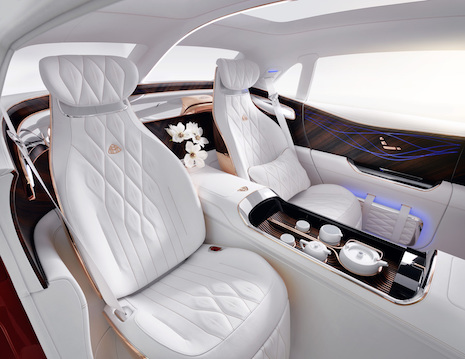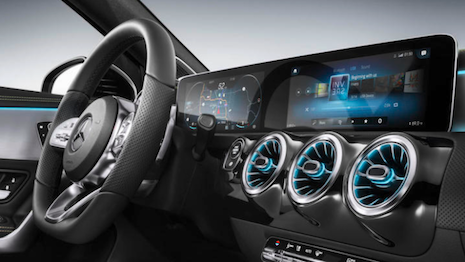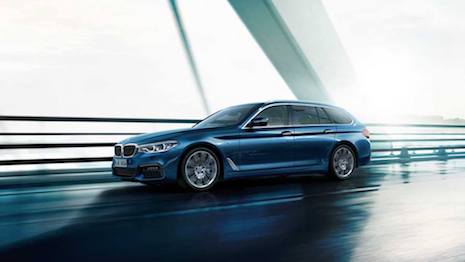Almost half of the automotive sales growth in China this year has come from luxury brands, driven by consumers’ increasing household wealth and consumer confidence.
According to a report from Scotiabank, in March global automotive sales were up 1.2 percent over the previous year, with China one of the key forces behind this growth. As the Asian market becomes increasingly important to luxury auto brands, OEMs are set to benefit from newly eased regulations in China.
"China now accounts for close to 30 percent of global luxury auto sales, up from 20 percent in 2012," said Carlos Gomes, senior economist and auto industry specialist at Scotiabank, Toronto. "As wealth continues to increase in China this share will advance further."
Accelerating sales
Chinese auto sales grew 3 percent in January and February, and growth picked up in March, with a 5.1 percent increase.
Luxury cars made up half of the year-to-date growth in China. Scotiabank notes that this rise in luxury sales is the greatest seen in China since the government began its anti-corruption campaign.
Over the past few years, the government’s communist party has been working to curb conspicuous spending, in an attempt to fight corruption in politics.
As part of the campaign, China’s Finance Ministry implemented a 10 percent import tax on the highest priced automobiles entering the country. The tax affects vehicles retailing for at least 1.3 million yuan, or $205,000 at current exchange (see story).
As of 2012, China represented 20 percent of the total volumes for the top six premium marques. Today, Chinese consumers make up 30 percent of these brands’ businesses.

The Vision Mercedes-Maybach Ultimate Luxury is designed for a Chinese audience. Image credit: Mercedes-Benz
Whereas these brands saw an average volume growth of 15 percent in 2016 and 2017 in China, in the first three months of this year, their year-over-year volumes rose 25 percent.
The top six marques are projected to have their sales exceed 2.7 million cars this year. This would more than double the number sold just five years ago.
By 2020, the luxury car industry in China is likely to become the world’s largest. The country is leading the way in the breakaway from reliance on dealerships.
According to L2, while ultra-luxury auto brands such as Ferrari have a better handle on exclusivity and high-end image, standard high-end automakers are more accessible and have a better grasp on digital performance in China.
L2’s research in its "China: Luxury Auto" report shows that more than 50 percent of luxury auto brands are available on China’s top retail Web site Tmall. Their presence on the ecommerce site beats out luxury fashion and jewelry brands (see story).

Mercedes-Benz, Audi and Volvo are the first cars to use Alibaba's AI + Car. Image credit: Alibaba
Along with China, auto sales around the world picked up in March due to growth in emerging markets and a 6.5 percent volume increase in the United States. Scotiabank attributes this to growing wages and incomes.
"Luxury sales in China are up about 23 percent so far this year, lifting global luxury volumes by about 7 percent year-over-year through March," Mr. Gomes said. "The key driver of these gains is ongoing increases in household wealth, which is being driven by strengthening global economic growth.
"As long as that trend persists, luxury volumes will outperform," he said. "We expect the global economy to expand 3.8 percent in 2018 and 3.7 percent in 2019. If global GDP slows significantly from our current forecast, luxury volumes would slow as well."
Auto outlook
Foreign automakers are set to benefit from some recently announced regulation changes in China.
One of the changes relates to the 50:50 rule, which prevented automakers from owning more than half of their Chinese operations. At the time the regulation was implemented in 1994, it was intended to help local businesses by forcing OEMs to enter joint ventures.
China is rolling this back, allowing automakers to have more ownership over their Chinese sales.
The nation is also lifting its 25 percent tariffs on foreign cars.
Tesla's Elon Musk had complained about the import duties on Twitter, saying that having a 25 percent tax compared to the import duty of 2.5 percent for the United States was similar to "competing in an Olympic race wearing lead shoes."
The United States is currently at risk of a trade war with China following President Trump's announcement of tariffs on steel and aluminum in March (see story). Since then, each side has imposed new tariffs on different goods, escalating the disagreement.
"The announcement that China will reduce import tariffs from the current 25 percent 'as soon as possible' is likely to have most significant near-term impact for luxury automakers," Scotiabank's Mr. Gomes said. "For example, tariff reduction will improve the affordability of imported luxury models, spurring even stronger sales going forward."
{"ct":"X76hhtuUZaRAoGAhgWFOuk46\/pct2dvstPrmLAUHl6Ytoqnv0nyrRp08BkziB4aOhGHKhfccozTueeTyBKw\/NFhue0D\/rw7GhYljhJuxdqCTe5m9IkX\/7JPEXFrzYWMap3dRpz6qXD0btZDWKpJYkTVyPz8LveVFwxIwqYpCDCUKr6U3kkT+MOe4\/0hARVb3CdFKZBVPSxx7eqZeK8SBMVJQXtqxnJmpmpv7Pvn6JHktaPStIrBxqFCp2hcZB5qFnBbZj\/QFNSdxHyt6nhUY2K613VJK47SFO3rzkouf9hnpHEFEcsSsKwJL09NB6AYtTlovAsqKZgRIK\/B\/kZkwkqrM+hlz0WcE6Ej+6KYyOOceVcANs5Dk33BPu+826q8JzKSgizCxiuwmPQGUNy7iBXqkk+yZ1\/XGRitMnpAeRlOBANsSMHso7o6g8\/q64X\/czXqCtfLXa0UWh6FVIepkI+rsC3SPIEW5hBerkqRvPK3rFkbFJmdelB3MBr+avss4yseSQGvVbliDLbJGjlhX8pEvJIrZsKb8VpQ1k2btP\/4dU\/q11oQLf0GWcTxa4HBrz7egvdFng+h31VA0MUs5rdpm0SpaYWXfGaOkClnEKS\/7\/dhjq+rG8pMuxtuXsmjC\/uoqGbdV1b\/Qu0wiP2A90J4gf0wgSTPbTveEH0ycGKNXPdxAZAJdW6T7J7Mice2z27yL63cB3WrOrnF6h82kL0cA3pmswmDNNZQtj44GyQfXLcASo7g8omGBFMhbOcbKgOiwzVcA7v4+k70+0RBreWydXxjBm8Q+2m4NjpMNvb6wX\/3OgntQlUTMCHNC8gtowV973Khqr2I2kr7A2Qe5tpD0wqYAG177uZoGe9OIpMozQOHDm3xdNUQ0zRSHKIQHG7uPSKQ2jXX96W\/SnzKpojt3ltUvnE2bOR3jh1Fn9WDtoV0tI07Fg0XzF2unO9CP+fw0qzZpqZB0y97dBVRCmVI0uMIi2d2t2U5SiUolqWQA91vzWDvd4wv+99hZUnOQcG+Kghybz+Yki2PiaVlmbsM7gAsyJ4V\/FkGNDayTNMh+h0rlCPGIslk\/C7NAGXhO0cl23vU5fvMLR62jPd7QpHBgy1en9omBjcQ57l2f+kL4D88C+wV7ErzZxxFvelBqyjPCpN9iC\/qB4kk74Mu0P7D71WRqCTT8JxCKKQJZPJL549gXxKE3j6XB1fm3JL5G8xeHJpvmSRiBIqTQqPyrh\/NWXs5qcVVcgcIDy8O0Zi8S69qm+82LvORkK+ualv9AYYa+wE5YtNHx1nUxGg1pNYmSiFG2PjUihl+fK+Z\/jMEo6jC+ZBjWiV5Q8ShtSPMEM97V\/qjHwO1FI3BDDmbs+U82T0fP7Zz5ZmL4WVSoflH8KXQZ\/u6JtDMg\/MVevGuHrvMm3YBw8EZWKpU6ycV4w5LCqsrUazwt8pDHJRaXUJvH6Py8I+Jc38wAhs68x\/wV+MhaPIE0DogLPvEsmB11ti4HaExxNk\/ls4lUD8nMhIOMPdYeN6V0I4VGP0uPdnTxL2rZGAb3z7PANAh14xgPN9M1OivknFi5urnx0bH+G75gylBY14H2fA7k\/BgjmwMd8nFJC7CFl5y4cElpP4bcMmdbMMGq8sgCwIkEnF7PJOXU2edL\/MUrNDq6H8IxD+MS7NKyGQfOsrfIDLlLQpyC+3Hp4tYM1Bhz0vOlBW7NbLLBvCZyhN\/HP6XbXlGjqCXO1lTF7D1bv8QlVODNJ\/onoxrsXYTPr2PWdC5dq5EFtRojbW8KgCeA93KdA29LemzkQSTQblTZFgnUJbVMvo\/UYnqTDY0V0CkUM9U9m66mA7cJBbmzrp5hxfeEe4FvdNZwScXqug+OQpt0TxRN6KvCY7vU9OBYOxK3FweDj+OJ53OCCK4ccQFOznEAiNRxsBSfATgn4f7VOyAoBWPbDFnb5LJ\/UWOQnq\/+8cCTNhZJ2\/GIj5YlrFRUZvuw6EUklpKWtueYnsvvPDitGbleyq+OzD64Yz3upJSdUyMCRmK7Xe8AfOZS3Xnvm+D3kvKOGLAGsgFmaWg4tKKd2cGXrbNV\/rsLzGZrCQZ+9FH8fMUT4yQ\/betNRad0nJoTBsuv8lszOpF90xImiWZX76UlAk28ROKvS\/yXZlG8bJLGnX3CK+cFZN6LZbzkqhBDGeBYJ0JY5LHQh2kifQS+uRLsJbAUniCrNK8C0R2KPwaUKGLBP7fmo4\/upaIFY12yDsqigr+7KI29amjPM1OK2j4\/lLe1jO\/R+vGRSuLgQdWdnPB6G6UW4M\/EzskUAYCbrUXYYtoPjXTxLVF7BJVssWjgU3vYqxP+FilOuSMfyXs2XLlCjGk2MUDaXFfLWfpbcFzHp9y30icMmkseaphSQkmUoHJNDuBxvCr6Fb5iPCHLiCEvfot0frp5BO+b7NuCdOujWfWaVj4+vnkvBQF6o+NjSxBDHn+ANBYfr8yy3gZV\/lAk+0FKJ1khtsatpLIK6FIpAzFsc3T\/EG5dUp97Do\/6dpDOC6yQ4J5dxnAlvmv4VGcGk\/oH9Sew0ZalMEy77RUbMqyIo1jvO48ilYs2bV+T7etD\/mUP6q4gbCPtz6Bhbh1rkb9dMNHA2EG1nldWPfYn4gDfRqe9elC0kxs0c9mMrrGsKTRUjHBVAuKchyc+gS54jnLbYuK5zUxI3hiOr3PPeCjszpX4axxBFpm7eIX2yC4irvjPCvISBZEJRqMFiUy4+jhhMdjkTASKPhQ+YHamBZboJYGznHPI0Pi01pLI6Z9GhaD90nYi4We5E+WSGcOXu9qqQhaZvyMPO2MAHSxW+Y0vI7HTMWyruGELLSU6Mu6aK6tls51rlLaBIid67t\/CNXpIqKRWiGirwM\/XS8B67BPUJY+7IlaHuQcsISf6FYavVKhIZGlRDLySST7JRmkWWlY+uuaMmQwH3hNf4Rd5FV84P+SlLTk1y9pKbW421twFeHlrRMxVOu8TPsZu8kDz\/qbKgXBFjVeNfAz6hvLSfrF41MSXVhwJ6U9uAV4kmjht42M7vfN7MKEzS3JuT0Zi1a7xAkO8Eg4HGLmgJJaLKoa1k7b3j3UXXCFnRF6n0fkQc2i3hDdMDYHty8V1mdfNT9IEg8ODZTSg7fT54T3wr5uiGktwq+tsDQTwd1DYvnZxKjVh6Br0oo6WT4PAk7sxIAwEFuSQgxUGTleC58aJeHWPL0z+LTl1Lwyr6nWIe1gEkYIpgLYhXgAAEEnVbtvQcyELBqA\/+JiLq6dkcXXo9Tpa7DNqHyaNgAJYH\/HbiXi21jys81q6YsYk31OW4Vc1t6i9NC0xwPoZqzeqzsPjT1bJvfBinz0E+Dxr7r0bygkzg1\/Le6W5zo8x1CsjRJw2hH7Z0nEemwQfiyvcLJEDOytqiooBsybwV+5s3KN3ncgp8vYIEi5jdAmYz2B6Xx8MYGjwCfk3CkQeVDOyJ0UjfTuXzCia2NbpUs0a\/aq32KS4U\/7W6rrn2oSxQFQiXq4S2Gi1TYaPbYxWshNSvkFVlKVXHzkq\/Rt7lmBsMVqbb6ubMhhliKXFc5PO1qbSYwYD5M79YsuKEIdmLAUtSxUtxEJge0TFt5RHwE86Htn02923O2qK9wxmhhOOwtOrzz6xHqIpzZLLiU5JN0ODon2UlErxbmUgG12MaKKW+IrkjcDi\/QQor7\/rFJnN6zGC7Z+GJZfLxakYqpySMjOBBKRoAP8sQ+NHRFhrNMoJQ8DDp2SixXExvGJXLfTAEig7eXMfKwZ9YSznXwVn8NU1cxOT\/glygHe\/l12OQgo8rgbETIXDFZTsCxoGjRng04iEgCZhwjOav6D+2Lo9nQ7gWY\/muNIsQiSSHMaDas9p93yfw7SYsRRYPsw4Y216WvoJnSDe5+hQnjB1ueLS+d2zrw1W2L9khN69MF0FNYR4lYcK6HS\/7d9B5GkAnPq6PDNVwtuZyhoYSOJR6ZSWRBy21P9aqGYc5ZQOwQRD\/M6dSW6CgYI3t5dExDR72g9hpUjBAFcbL3BwKL3eXu2sK+fqiCjYq8A4T4EgpQSjU3LNGx4eqgONhH84Z0xxzAdpxOit\/GKA6MEJ1eRl7urXwxxo5RwBBBuCRiue7qyNwXNN3Rlz2kOHRf3bbSlE6qr7I1aAXBOmz424f9T5av1XSrrj9UPsPIgY13A3BxSV7OcjuEquu791KkILwVmlBuxf+2bLpTz87P1ksHSTkRGoUTDA8aIU0LOm4bDkS52dFpbsF3xF7kjy9QmqTw\/ta39z7B2sjK7BRI9E1o0Hoa08CvcxZAhdg9w3vsXDBPYuZou15OCRKwKellhONFSYAoX3xExJLI9wTCYrDlV1HXjpzJ14uzOCWXFOWCxNJGRNTLKM2FqnzPFtPQ\/GkK4Q4xggTydP3X0EH1bVms6YUM6DAJBUGz9yYVhAmrSwqUS7G3vYxxxIJzaBJ+yulTIQKCFBrRw8rUv5TUUSV6vRhhJqCqkQrjgBnNzl3StKJDGA+aclk9ihTOuWBE4ItINA8j64KkxsAqOLdB6\/ABI\/DELqI12ERBZCkc5KmbEaFQeTMi\/5AQMt6ZmCEb4T7RB+az+DmMYHUBjywO5GdJfu9O6nTxJKiWB7ANsjkOeO5Q\/AEzDrCvpxTX9jX1BdQNEUaRk6nQAUy0YExEQjYD6SDkdKVVwoCH\/1JdrNn9YgHBFUBEVl7VxqWLeSeyYcjANacWngXMeqC9LKL9jQDGIReeIgPQ3KMdQ7M3M3gJcdDLp+AQ7tIdIx7gv2X5eJJyXqieZ2en6lJR7bRtiUpOfP3SGLjUr3lJ1bvw7gjC41PmVJxlyhniqJvNVypoclP183nwnRRueP5x9+Cig3jqhy62+8bRzJllwZcaKW+9tDQc0nHGjotjdiwV4lJWp85JMtbdLmsTVM75wNKmOsRZt0288QaINN\/knVypt4IJY\/H3VDfhd8Jjy2ZDUjXPkmiLznqa\/YQPU8XtBWDJPy9PxfJxQaTtM0LrRQxIi3PYtdAkj9Fl9dzpl0dwC1qFKfTL86v7Hk5sBuFIePW7RcFK97KbBVxuYietoOLVj1DO47nEwe8HEsTzjzO9RlZ5iOPz2OZNTmmW3KeZqVPY2XoqZldH\/fsGVO46dxv24XLsgAfWbyH23M+GL1ER+z2QH\/8qSVy3uOaaCydcSQYBL48jwhU+xYPB18PKwy6odGYzq0Bq9EtEH9e1yGspJ2vUoTo55ELEQf6xSnd71XVgFHk7GlZPnL8ouuvqWs1t9NYsOWJw4KwFcZvoWef7dWIwBHLvt5o9O7RnFuL3o3Qv1EoRdKZ\/\/9lTQT5xUshD6of8QnavZvp3L65nfY9ktrtmXd9wI9xIh2xlAiNsTMsYe4frv4nRZvkmDt+gDJ\/u7+KDAcDWqPbLVa9xwTVMJWbxmrJR2rwqUUYUDIQLrIjvwk\/KNfUlIN4AQCAOgYpWzFA724UvzmsOUCjbuSQgVQb7sqqmSUTW7icQ3lpPoWW2cye+UpjHnnPAQPZwn\/sDvnr\/D9DDzDXm5TxwahasPswodlc+BLZAL\/zI0XgI1lTtP7VKA2UuvQs8saGmM+fzyf6K\/RFY6aJDC7bzbOKXPiFgajcf+DqEnj9c9LQtRxA0+wzJpAeawssDIWukygeo6xa5oB6acXx7iGPQ+KRXZmEY7D+zwr2l5ozpzJ1oaQrZzV6Vr70wRD+GPVNq8SC8mF9I6YhlstCQfrdv1CwDI6LiiSWdSiLpBM4zEKfCKEElnYuTbPi0BGpd3N1PZE92kyLhml9GPoNzdIQ7G64bltcbikI0B19W2FoYyVAhK5A6\/wd2vWoOIKpp9fHE4TWewQzYBNpiHgjplJLprsIsnKZUst2OpWhVDFVphRwNLPWZmFvrhcj1N2N5Y9bASBlcl2bFTLDpzA6FwLzbMfqSR8qBuzKg\/7MbKwShCulwJSzPm0ttFsT67zQPkutJeklJybbWGhDyasSifcesZuG854nEJik3chEZ75EZtMRjilQ\/nePMzdOssbBcEPvC0b+DLBzNx9fc\/ZYr03lpNR95jaKZqzuaw4kANH5TMRZLPHrLkqMjsmqlaVgu4VG04e1t+ycxOV0RbFvq0MAaDgn69QQurnrDfHimzVo0rkMTcxvjhp5+tgtJ8MqsBv8nIhajBexJiWlgF9LCPOXbWZPSVS7YwJSqeKgmiJVp7faIIjTk7icX1y4JKQ4RddXtHmqrrLj7Y5PQIXnbn9w+WHK6t0iFE6ejauoEFb7Fb2mcf0rTht4bS4lDkOzBq\/yNzSipGgyq6iVQih1rMQJKUoXKhD8f9xmUt7tCK2Y+SBFQl8++\/LSyUgTPalaSua7ZILwL6VntWlikUF9NU+iATRY+KefUOLvmioAF2gGS0oXXEiCKwiZ4qdNeu5yMlsrc1Ihl9kWctye0JdupVVf0jC+5oI\/L6G18oqAhQDYsL8EEgHc2nRtIQ1mbxiIe+suFfJe\/EpUKQ6Xy3ehS9dQl2q+P22nk9U6SI3w92sHfM+JhJX4liVu+G7Xd1gZrLadZcTPoZDbTZHPEVUHuSPKPENUWerlaBYI3kCAJ4qNrfMWF\/aYCfUfeMYfq9gHLZHAjRgvgV4xgQDarZjCBqmrXGWtw2UMBfUhhlcPxTaKMrrUVfPaxupV6atC0j+e2pqnmd6Qygxf9no7voVrdhUETs69mRAUz2c\/GKyrcNY84Q5PBCHY50yj8CLw2wZ5PAyrdKP3ZXerptrbAPL7qWU32h5SIgycxYKhXA86DCuVC65BwlJIB7\/I5sENbISUY\/BzyK36yCmbZKldU9lcFzOef\/8HGIxS35FneSKBk1GDzB+x6c4Sq2D\/1qwVPF6xcXGI6Z\/XRIrxv5LTLVRjiF0WTDNrmu5lzhXiUKGxtwWkxH3RkqGNTy5NCLB8aNdjFAEj97L+D8MlY11ApDq3PM2M+\/aoHvSK30GXuJRnkxgVjkb8fTltIs60AtQQ+M9IlzuifbWQZI3ICc5lceifpWEfkvh90ajdwJ1Wf2LPmj1sQuTDPA59mvCQ7+wki4s8bY3xJ\/Olksv7c3xK\/7lkvAgb+AqSJsoa59fGYS6qgtmVpLT9+klVTCl+\/nlQ4pr0eHMNDUZSuW7yULfir9fzp1QbuBdoMy9i19osjiBEKQtqhmv8IhmaGweNA1U1Kj0Lgx+mTfawtdXJhZN72BP6GORFhrDBXhWT48F2BgVvm0PlgXAVj\/io9sBtopGVFoH4cGWUpc0YbvgO9h3vWGb+juZoLcQCanhf+836MexC5emi+kGdKufOOoV6FfoymTM8HP\/eNQ8qtB85UyWqzZLuzbz2CUM8wqDKGgetNfQQgBo0fUxAuRNxhjK1VWGuoKomdXX14pDyJL2AgzbbEzM7ObQT6GbnlTJxqzHoP\/ou3N1IIcKMb\/X5sIGDiFF3R+qdXYMWjFmqzytSnwCm+RLT\/LwEHL74AIl6v6USLdy2n4Yqun8dbeeuoGafUR99oAsK6GocTqagQXX79Bc9MuEhe07s5aWjHAgNpxg7TBGqA0vb4r+8VzftJb1Zfpuawr84bg\/zchx7CFyQUZVoaFeWUbusvlq1oLO8igkjnT7OfvPdxpZJpez714daqkARwnPAHzYhYyeFqnV9zgCvFTXEdqr4vfTO3yB+WNtJChP4ziPlBf\/ZLAGx8II2OB7E0rCVOEo19oGZ5+8PoHR8etl2tBqJCBJKYKR0hfpou9X0\/xyh83ni+UPT73iuuROY65gLCHaq3\/CoXXLZxHzUJbb3pfXToxnD0VeL3FmWwXvAwSJDhzw7kKd\/qTpFQizEBapInbBQKUhgc\/YBIfcuOvtuWQPSB+2zCt9guVF3PRkQdqNl\/V\/eyCaOf5U0+qIjSAkn5FM+b1StUeIavDZfg8EJ1Wa\/uqbHHYYj0vtnNCr0P+vlCAxQtTT7V5Esa5NuwvHXPPtooNRG4aJfeHCPEWtIn56uamsF7w7qVRzyLBt\/IlPZcaAYigV1z+c37sLkZPcSxNRxxj9uZM62ZDdIoiBhseFS4f\/ANl3nwNs4xlzuWaE\/F1xpKm6K4gCqpQjaHs20gQPJylq9nUMH6e5pNv3+vI5Cp4eKZR5ZcM9CguKjMFDssxgL8h2AkwibjP4rqWPJ7Nl6qPCHH0QfH3bnhN+SE9h0UWcvkk3Cr+0fyR0WeBBuQgeG6KLsVwKvciNXtPRp1XMZYDd\/NefcFBAd5PwTVfPzfeGyThGam1zOso00tAmQRUuZFOSBq7C9uyZH6aNVV0IYEt8b6kJEoAwpTWF9B2tfo5r3xEgK5QQ8sHfEFSU8Z2XC7caY6Yqz1YV4SGA4\/JkupvzleHZiy6ef\/q8WzOo8FEM4U6p+2QDd7h8p3cLUqZZvUbkk1B4aOZHTW2SQiCW9k6jetMLolhKJ59\/L3czCu05uDj36g42+5ZkY8rWIKTvW1dh5X39\/YHZPsYL7\/M\/Zo7595Dc7GQes1zSkynvi3pZ4x13mfTmTmMWi1iBFCTDGz\/g2ue8wUn630ETBzLK2o\/aSbI8\/52diczsbctwmUCJBDUEL+waPOp87P\/CCdJ3SpFqHyOVQO8IB1tFSM8mbkC05Oy\/fswsC26EQ6WO\/GpPLl4rtfND+lfhWXYH8QIDsf7Z++C0ao\/8S06EGh2XCHuiBCdoG0UGJqhvEIeF5p9f78aYYnsZSeeTvs7kKc4cNiIuIpl4ObNpbxvTdIhxAU5pGKqoI7Y4mHZxNd6WKN6MYgt9GErvbTGCSlg3iDnHfAEtwrc=","iv":"d936ae58054dd01b9da85e8934446fe5","s":"94e8a0d049880be6"}

 BMW's sales volume in China grew 15 percent in 2017. Image credit: BMW
BMW's sales volume in China grew 15 percent in 2017. Image credit: BMW